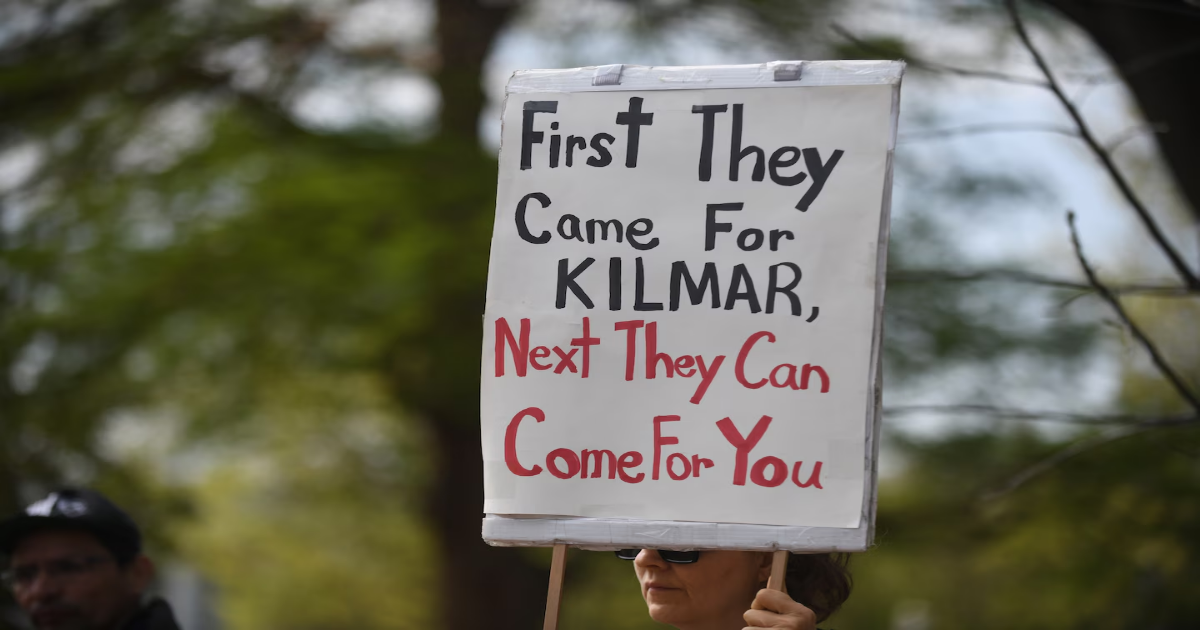Mary B. McCord is the executive director of Georgetown Law School’s Institute for Constitutional Advocacy and Protection and a former acting assistant attorney general for national security and longtime federal prosecutor.
The government’s cat-and-mouse game with a federal district court in Maryland over the return of Kilmar Abrego García — erroneously deported in March to El Salvador — needs to stop. It’s time for the U.S. officials, who can answer the court’s questions about what the government has done and is doing to “facilitate” his return, to take the witness stand, raise their right hands, and swear to tell the truth, the whole truth and nothing but the truth.
Last Thursday, the Supreme Court denied the government’s motion to vacate U.S. District Judge Paula Xinis’s order to “facilitate and effectuate” Abrego García’s return. The high court made clear that the lower court had “properly” required the government to “facilitate” his release from custody in El Salvador “and to ensure that his case is handled as it would have been had he not been improperly sent to El Salvador.” It directed the lower court to “clarify” the meaning of “effectuate” in its order, with due regard to deference to the executive branch in conducting foreign affairs. And it directed that “the Government should be prepared to share what it can concerning the steps it has taken and the prospect of further steps.”
And that’s where the cat-and-mouse game began. Abrego García fled gang violence in El Salvador as teenager in 2011, is now married to a U.S. citizen, has U.S. citizen children, and has a 2019 court order requiring that he not be deported to El Salvador because of the likelihood of persecution there. Just hours after the Supreme Court’s ruling Thursday evening, Xinis clarified that she was directing the government to “take all available steps to facilitate the return of Abrego García to the United States as soon as possible.”
Xinis required the government to submit a sworn declaration by an official with personal knowledge, by Friday morning, answering three questions: (1) Abrego García’s current physical location and custodial status; (2) what steps the government has taken to facilitate his immediate return to the U.S.; and (3) what additional steps the government will take to facilitate his return.
The government in response complained that Xinis’s deadline was “unreasonable and impracticable.” At a hearing on Friday afternoon, the government attorney was unable to answer what the judge said was “a very simple question … where is he?” Nor could the attorney say what steps the government had taken to facilitate Abrego García’s return. Clearly frustrated, Xinis ordered the government to file a declaration, again by an official with personal knowledge, by 5 p.m. each day, beginning Saturday, answering the judge’s three questions.
As of Monday, only one question has been answered. A State Department official confirmed in a Saturday declaration what has been suspected all along — that Abrego García “is currently being held in the Terrorism Confinement Center in El Salvador.” As for his custodial status, the official reported that Abrego García “is detained pursuant to the sovereign, domestic authority of El Salvador.”
Does this mean that he is now being held by the Salvadoran government based on unknown and unreported charges leveled against him by that government, despite the fact that the only basis for deporting him was the U.S. government’s mistake? Or does this mean that the Salvadoran government has used its “sovereign, domestic authority” to enter into some kind of agreement with the United States to house its deportees?
The answers make a difference, because they directly relate to what our government can do to facilitate his return. But we don’t know the answers, because no explanation was given.
That’s why Xinis should order senior officials — the actual decision-makers — to testify about what steps the government has taken and will take to facilitate Abrego García’s return. Though sworn declarations are often accepted by the courts as a substitute for in-person testimony from high-level government officials, when a declaration raises more questions than it answers — and suggests post hoc justifications for the government’s actions, as may have occurred here — live testimony is warranted.
This is especially true when government officials are now suggesting outside of the courtroom that they are required only to allow Abrego García to return should the Salvadoran government release him. Under oath, subject to penalties of perjury and contempt of court, it will be harder to avoid answering the questions that both the district court and the Supreme Court have ordered the government to answer.
Without direct testimony, the government’s wordplay will just continue. On Sunday, a Department of Homeland Security official submitted a declaration that stated that although Abrego García had been sent to El Salvador in violation of the 2019 court order, the official now understands that Abrego García could not benefit from that order “because of his membership in MS-13 which is now a designated foreign terrorist organization.”
MS-13 was declared a foreign terrorist organization in late February. The government contends that Abrego García is a member of the gang but it has provided no current evidence for that claim. He was given no opportunity to contest the allegation before being flown out of the country. Is the government now claiming that it need not “facilitate” Abrego García’s return — as directed by the Supreme Court — because it has determined he is a member of an organization newly deemed a foreign terrorist organization?
We don’t know the answer to that question, either, because no explanation has been given.
